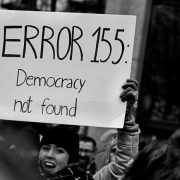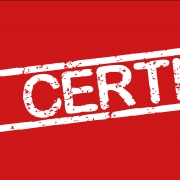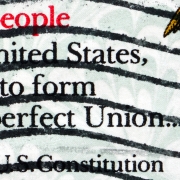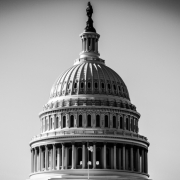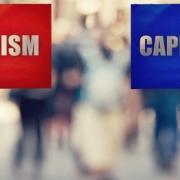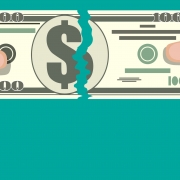The gulf between the government and the governed is wider than it has ever been and getting wider. Of course, it has always been there. Many of the authors of the Constitution were feudal plantation owners and wealthy city lawyers in a land of farmers and laborers, but at least they understood principles of natural law, liberty and individualism.
Today, all pretensions of sympathy with the citizenry have been dropped. The ruling class despises us. It is an across-the-board dismissal of the relevance of an electorate.
Spending Is Independent Of Taxation.
The old complaint was “No taxation without representation”. That’s now superseded by the principle that the government can spend whatever it wants, unrestricted by the amount of tax revenues collected. When governments spent more than the taxpayers gave them, it used to be called a deficit. Today, with modern monetary theory (MMT), even the soft shackles of deficit spending have been eliminated. According to MMT, a sovereign government with its own money printing press can spend without restraint. Therefore it need pay no attention to the tax base or the taxpayers. Their opinions have no merit. And government power lies in its expenditures; that power is expanding all the time, unconstrained.
The Overwhelming Administrative State.
Unlimited government spending brings into being an unlimited administrative state. Legislators write a torrent of laws, but they’re meaningless without enforcement. The administrative state is enforcement. First, they translate and expand legislation into copious rules and regulations and requirements for permits, completed forms, and conformity to arcane requirements expressed in small print in indecipherable language. Second, they apply the rules and regulations with inspections, enforcement actions, fines, imprisonment, cease and desist orders and confiscation. It’s virtually impossible to fight the IRS, the SEC or the FDA if a business or an individual gets on the wrong side of them. There is no balance of power; it’s all on the government’s side.
Authoritarianism.
Unconstrained spending, unconstrained rule-making and unconstrained enforcement quickly become authoritarianism: what they say goes. Think of all the businesses that have been shut down during the pandemic lockdowns by city authorities, county health boards or state governors. Where did the authority come from to do that? They just grabbed it, asserted it, imposed it. They are the imposers and we are the imposed upon.
Expert rule: their word is law.
One of the consequences of the increasing power of the administrative state is their assertion of expertise as an underpinning of their authority. As we are experiencing, this is not science.
The scientific method is a mode of inquiry, a collaboration around alternative possible answers to challenging questions. Different individuals and groups develop different hypotheses, test those hypotheses, analyze the results of their tests and eventually arrive at a consensus position backed by many iterations of data from multiple levels ranging from the microscope and laboratory to the natural world.
This is not how the so-called science of government-approved experts applies. To the contrary, their experts are always right, and the directions they give must be faithfully followed. If those experts change their minds or change their directions, their new positions are the correct ones and must be followed even if they represent a reversal of a previous course (“wear masks”, “don’t wear masks”).
Most importantly, your opinion does not matter and your data does not count. Only government-approved experts can be “right”.
Corporatism – a new control route.
In the US, we are reluctant to think about our large corporations as arms of or as agents for government control. Yet recently, we’ve been jarred from our complacency by the sudden exertion of politically opportunistic speech controls by Twitter, Google, Apple, and Amazon. These 4 companies represent large centers of private power and are dangerous to the continuing vitality of a free people (as Scott Galloway, author of The Four, phrased it). But now we begin to learn about how intertwined they are with government, via shared purpose, shared contracts, lobbying, and payments. They are no longer limited to the exertion of private power, they can deploy power on behalf of, or alongside, government.
They despise us.
The degree to which we are the object of the derision of the ruling class can be captured in the remarks of those at the very top of the pyramid.
In April, 2008, Barack Obama said:
“And it’s not surprising then that they get bitter, they cling to guns or religion or antipathy to people who aren’t like them or anti-immigrant sentiment or anti-trade sentiment as a way to explain their frustrations.”
Obama saw us as an underclass.
Further, the underclass was labeled by Obama as being against others not like them – yet, this same underclass helped elect Obama to the office of president a few months later.
Eight years later, Hillary Clinton confirmed the ruling class point of view:
“You know, to just be grossly generalistic, you could put half of Trump’s supporters into what I call the basket of deplorables. Right?
“The racist, sexist, homophobic, xenophobic, Islamaphobic — you name it. And unfortunately, there are people like that. And he has lifted them up. He has given voice to their websites that used to only have 11,000 people — now how 11 million. He tweets and retweets their offensive hateful mean-spirited rhetoric. Now, some of those folks — they are irredeemable, but thankfully they are not America.”
If you believe there is something in America worth saving and celebrating, you are deplorable and irredeemable. You are not America.
We despise them.
Pew Research publishes polls depicting measures of trust in government, the proxy for our ruling class. In 1964, Pew reports that 77% of Americans said they can trust the government in Washington. In 2019, that number was 17%. Its low point was 2011, when only 10% of Americans said they could trust the government. The latest published number is 17%.
So up to 90% of Americans display a lack of trust in the institutions of the ruling class: their legislation, their security systems, their police forces, their administrative bureaucracies, their regulations, their electoral procedures, their experts, their entire system of rule.
This is the ultimate condemnation. We used to believe – we were taught in school, anyway – that our institutions had emerged beneficently over time to protect, support, and ensure our way of life. Now the ruling class has undermined the most fundamental of the binding institutions, democracy.
Charles Ess, professor of digital ethics, at the University of Oslo, is quoted on the Pew Research site as saying,
“Democracy – its foundational norms and principles, including basic rights to privacy, freedom of expression and rights to contest and conscientiously disobey – may survive in some form and in some places by 2030; but there are many strong reasons, alas, to think that it will be pushed to the margins in even traditionally democratic countries by the forces of surveillance capitalism, coupled with increasing citizen feelings of powerlessness against these forces, along with manipulation of information and elections, etc. “
The gulf between rulers and ruled is now unbridgeable. We await the next stage.
